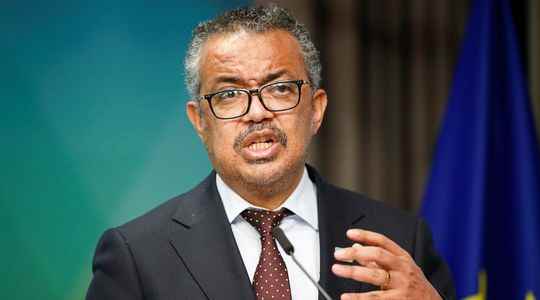“The end of the pandemic is in sight”, “the world has never been in a better position to end the pandemic”… Anyone who would have read only the headlines of the articles published after the last conference of press of Tedros Adhanom Ghebreyesus, the director general of the World Health Organization, would think that we are soon out of the woods. Mistake ! A bit like with an insurance contract to read until the last line, you have to listen to the speech of the boss of the WHO in full, until his last sentence.
Immediately after uttering these very optimistic words, the first in a long time, the boss of the WHO added a big “SI” in red letters. The end of the pandemic is in sight… IF and only if we continue to fight against the virus: “Like a marathon runner who finally sees the finish line, there is no worse time to stop running On the contrary, we must run even faster to reap the fruits of our efforts,” he said.
Six recommendations for governments
Of course, very encouraging signals have appeared, and in particular the drop in mortality due to Covid, which “has never been so low since the start of the epidemic”, underlined Tedros. We also have tools (vaccines, antivirals, etc.) that put us in a much better position than in 2020. But to succeed in defeating the virus, we must not relax: the very positive speech of the director general of the main objective of the WHO was to draw attention to six recommendations published by the organization for health authorities pretty much everywhere in the world.
Recommendations to be implemented urgently, if we really want to get out of the pandemic. They are nothing very new: vaccinating 70% of the world’s population, and 100% of people at risk; continue testing and sequencing; remain ready to take care of the sick in the event of a further increase in hospitalizations; make proven antivirals available; keep protective measures in hospitals; continue to educate the general public.
Encouragement to move on
A reminder in the form of a warning, while all over the world, countries are relaxing their vigilance in the face of the virus. “The number of people tested and the number of viruses sequenced is decreasing and that worries me, because we are losing our ability to see the variants of concern emerge. We risk acting late if that happens,” said Dr Myke Ryan. , Executive Director of the WHO Emergency Management Programme.
Under these conditions, one can wonder if Tedros’ speech is not too optimistic and counterproductive in relation to the objectives pursued by the WHO. We all want the epidemic to end, and hearing that the end is near could be taken as an encouragement to move on. Unfortunately, the full message from the WHO is quite the opposite, and caution should remain in order.
